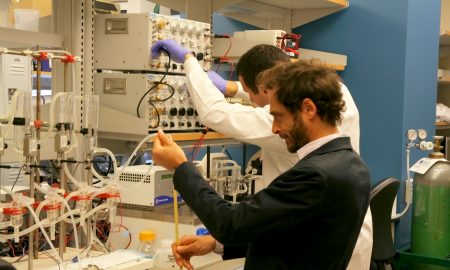News
-

 224
224Korean Researchers Develop Device That Can Control Speed of Light
Korean researchers have developed a device that can control the speed of light. The new device is expected to accelerate the development of next-generation optical communication equipment.
-

 304
304How to understand one of Stephen Hawking’s final papers – according to an expert
We may not live in an infinite 'multiverse' of parallel universes after all.
-

 223
223Google Cloud Platform announces new credits program for researchers
Using Google Cloud Platform (GCP), researchers are accelerating breakthroughs and asking new questions they could never have asked before. Now GCP will be available to even more academic researchers through the new GCP research credits program.
-

 227
227Scientists discover how to harness the power of quantum spookiness by entangling clouds of atoms
Experiment produces thousands of entangled atoms, raising hopes that we can soon create real quantum computers.
-

 114
114Scientists Fix Genetic Risk Factor for Alzheimer’s Disease in Human Brain Cells
New insights into how a gene causes damage could impact future drug development
-

 120
120Machine learning offers new way of designing chiral crystals
Engineers and chemists at Hiroshima University successfully used the same technology at the core of facial recognition to design chiral crystals. This is the first study reporting the use of this technology, called logistic regression analysis, to predict which chemical groups are best for making chiral molecules.
-

 119
119Knitting electronics with yarn batteries
When someone thinks about knitting, they usually don't conjure up an image of sweaters and scarves made of yarn that can power watches and lights. But that's just what one group is reporting … they have developed a rechargeable yarn battery that is waterproof and flexible. It also can be cut into pieces and still work.
-

 234
234Houston Methodist Researcher Makes Bold Move by Releasing Nanotech ‘Recipe’
In a rare move, a Houston Methodist researcher is sharing his recipe for a new, more affordable way to make nanoparticles.
-

 194
194Artificial Intelligence Techniques Reconstruct Mysteries of Quantum Systems
New machine learning techniques can help experimentalists probe systems of particles exponentially faster than conventional, brute-force techniques
-

 128
128Scope of nanotechnology widens in 2018
There's miniaturization, and then there's nanotechnology. Global markets are growing and multiplying for both. But it's the point of nanotech to effect desired technical solutions and outcomes with ever-smaller - much, much smaller - building blocks of materials.










